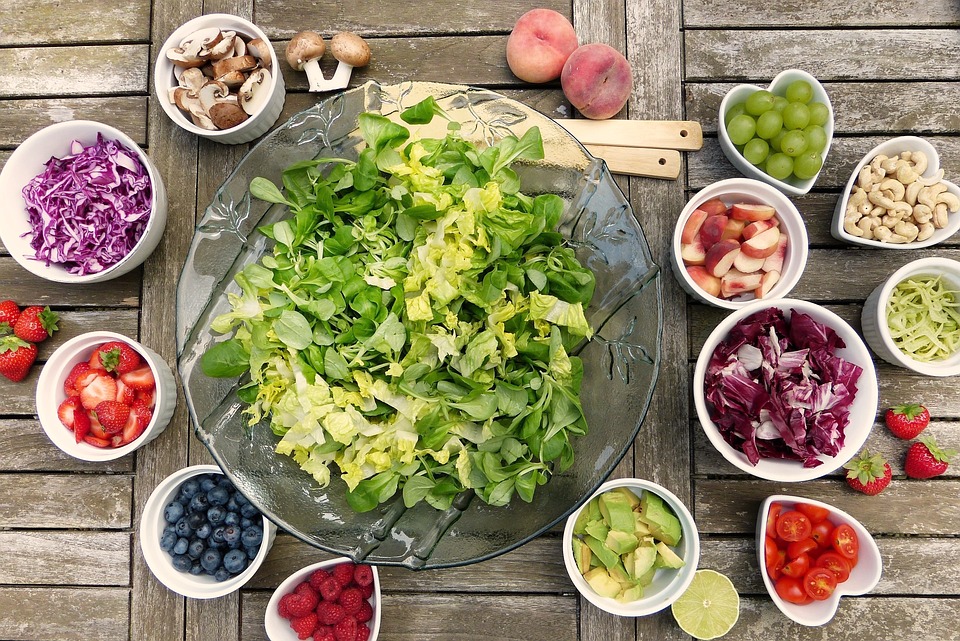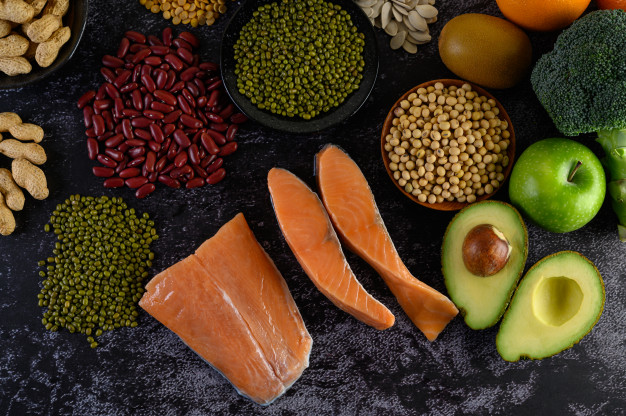Micronutrients are one of the major groups of nutrients your body needs. They include vitamins and minerals.
Vitamins are necessary for energy production, immune function, blood clotting and other functions. Meanwhile, minerals play an important role in growth, bone health, fluid balance and several other processes.
This article provides a detailed overview of micronutrients, their functions and implications of excess consumption or deficiency.
The term micronutrients is used to describe vitamins and minerals in general.
Macronutrients, on the other hand, include proteins, fats and carbohydrates.
Your body needs smaller amounts of micronutrients relative to macronutrients. That’s why they’re labeled “micro.”
Humans must obtain micronutrients from food since your body cannot produce vitamins and minerals — for the most part. That’s why they’re also referred to as essential nutrients.
Vitamins are organic compounds made by plants and animals which can be broken down by heat, acid or air. On the other hand, minerals are inorganic, exist in soil or water and cannot be broken down.
When you eat, you consume the vitamins that plants and animals created or the minerals they absorbed.
The micronutrient content of each food is different, so it’s best to eat a variety of foods to get enough vitamins and minerals.
An adequate intake of all micronutrients is necessary for optimal health, as each vitamin and mineral has a specific role in your body.
Vitamins and minerals are vital for growth, immune function, brain development and many other important functions (1Trusted Source, 2Trusted Source, 3Trusted Source).
Depending on their function, certain micronutrients also play a role in preventing and fighting disease (4Trusted Source, 5Trusted Source, 6Trusted Source).
Summary
Micronutrients include vitamins and minerals. They’re critical for several important functions in your body and must be consumed from food.
Vitamins and minerals can be divided into four categories: water-soluble vitamins, fat-soluble vitamins, macrominerals and trace minerals.
Regardless of type, vitamins and minerals are absorbed in similar ways in your body and interact in many processes.
Water-Soluble Vitamins
Most vitamins dissolve in water and are therefore known as water-soluble. They’re not easily stored in your body and get flushed out with urine when consumed in excess.
While each water-soluble vitamin has a unique role, their functions are related.
For example, most B vitamins act as coenzymes that help trigger important chemical reactions. A lot of these reactions are necessary for energy production.
The water-soluble vitamins — with some of their functions — are:
-
Vitamin B1 (thiamine): Helps convert nutrients into energy (7).
-
Vitamin B2 (riboflavin): Necessary for energy production, cell function and fat metabolism (8).
-
Vitamin B3 (niacin): Drives the production of energy from food (9, 10).
-
Vitamin B5 (pantothenic acid): Necessary for fatty acid synthesis (11).
-
Vitamin B6 (pyridoxine): Helps your body release sugar from stored carbohydrates for energy and create red blood cells (12).
-
Vitamin B7 (biotin): Plays a role in the metabolism of fatty acids, amino acids and glucose (13).
-
Vitamin B9 (folate): Important for proper cell division (14).
-
Vitamin B12 (cobalamin): Necessary for red blood cell formation and proper nervous system and brain function (15).
-
Vitamin C (ascorbic acid): Required for the creation of neurotransmitters and collagen, the main protein in your skin (16).
As you can see, water-soluble vitamins play an important role in producing energy but also have several other functions.
Since these vitamins are not stored in your body, it’s important to get enough of them from food.
Sources and Recommended Dietary Allowances (RDAs) or Adequate Intakes (AIs) of water-soluble vitamins are (7, 8, 10, 11, 12, 13, 14, 15, 16):
All micronutrients are extremely important for the proper functioning of your body.
Consuming an adequate amount of the different vitamins and minerals is key to optimal health and may even help fight disease.
This is because micronutrients are part of nearly every process in your body. Moreover, certain vitamins and minerals can act as antioxidants.
Antioxidants may protect against cell damage that has been associated with certain diseases, including cancer, Alzheimer’s and heart disease (35Trusted Source, 36Trusted Source, 37Trusted Source).
For example, research has linked an adequate dietary intake of vitamins A and C with a lower risk of some types of cancer (4Trusted Source, 5Trusted Source).
Getting enough of some vitamins may also help prevent Alzheimer’s disease. A review of seven studies found that adequate dietary intake of vitamins E, C and A is associated with a 24%, 17% and 12% reduced risk of developing Alzheimer’s, respectively (6Trusted Source, 38Trusted Source).
Certain minerals may also play a role in preventing and fighting disease.
Research has linked low blood levels of selenium to a higher risk of heart disease. A review of observational studies found that the risk of heart disease decreased by 24% when blood concentrations of selenium increased by 50% (39Trusted Source).
Additionally, a review of 22 studies noticed that adequate calcium intake decreases the risk of death from heart disease and all other causes (40Trusted Source).
These studies suggest that consuming enough of all micronutrients — especially those with antioxidant properties — provides ample health benefits.
However, it’s unclear whether consuming more than the recommended amounts of certain micronutrients — either from foods or supplements — offers additional benefits (41Trusted Source, 42Trusted Source).
Summary
Micronutrients are part of nearly every process in your body. Some even act as antioxidants. Due to their important role in health, they may protect against diseases.
Micronutrients are needed in specific amounts to perform their unique functions in your body.
Getting too much or too little of a vitamin or mineral can lead to negative side effects.
Deficiencies
Most healthy adults can get an adequate amount of micronutrients from a balanced diet, but there are some common nutrient deficiencies that affect certain populations.
These include:
-
Vitamin D: Approximately 77% of Americans are deficient in vitamin D, mostly due to lack of sun exposure (43Trusted Source).
-
Vitamin B12: Vegans and vegetarians may develop vitamin B12 deficiency from refraining from animal products. Elderly individuals are also at risk due to decreased absorption with age (44Trusted Source, 45Trusted Source).
-
Vitamin A: The diets of women and children in developing countries often lack adequate vitamin A (46Trusted Source).
-
Iron: Deficiency of this mineral is common among preschool children, menstruating women and vegans (47Trusted Source, 48Trusted Source).
-
Calcium: Close to 22% and 10% of men and women over 50, respectively, don’t get enough calcium (49Trusted Source).
The signs, symptoms and long-term effects of these deficiencies depend on each nutrient but can be detrimental to the proper functioning of your body and optimal health.
Toxicities
Micronutrient toxicities are less common than deficiencies.
They are most likely to occur with large doses of the fat-soluble vitamins A, D, E and K since these nutrients can be stored in your liver and fatty tissues. They cannot be excreted from your body like water-soluble vitamins.
A micronutrient toxicity usually develops from supplementing with excess amounts — rarely from food sources. Signs and symptoms of toxicity vary depending on the nutrient.
It’s important to note that excessive consumption of certain nutrients can still be dangerous even if it does not lead to overt toxicity symptoms.
One study examined over 18,000 people with a high risk of lung cancer due to past smoking or asbestos exposure. The intervention group received two types of vitamin A — 30 mg of beta-carotene and 25,000 IU of retinyl palmitate a day (50Trusted Source).
The trial was halted ahead of schedule when the intervention group showed 28% more cases of lung cancer and a 17% greater incidence of death over 11 years compared to the control group (50Trusted Source).
Micronutrient Supplements
The safest and most effective way to get adequate vitamin and mineral intake appears to be from food sources (51Trusted Source, 52Trusted Source).
More research is needed to fully understand the long-term effects of toxicities and supplements.
However, people at risk of specific nutrient deficiencies may benefit from taking supplements under the supervision of a doctor.
If you’re interested in taking micronutrient supplements, look for products certified by a third party. Unless otherwise directed by a healthcare provider, be sure to avoid products that contain “super” or “mega” doses of any nutrient.
Summary
Since your body requires micronutrients in specific amounts, deficiencies and surpluses of any one nutrient may lead to negative issues. If you’re at risk of a specific deficiency, talk to your doctor before starting supplements.
The term micronutrients refers to vitamins and minerals, which can be divided into macrominerals, trace minerals and water- and fat-soluble vitamins.
Vitamins are needed for energy production, immune function, blood clotting and other functions while minerals benefit growth, bone health, fluid balance and other processes.
To get an adequate amount of micronutrients, aim for a balanced diet containing a variety of foods.

















